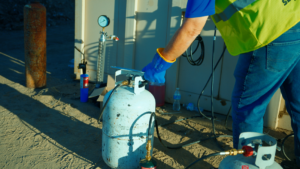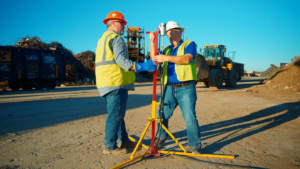In December 2024, the Propane Education & Research Council (PERC) approved funding for the Recycle Education & Research Foundation (RERF) to develop and implement a propane program tailored specifically for the recycled materials industry.
This one-year program will consist of tank identification resources, tank evacuation training curriculum, digital training resources, in-person training, and access to an online propane resource library. The program will also include an industry relations component that will focus on building local partnerships between recycled materials facilities and propane retailers. Lastly, it will feature an online directory of propane companies that offer tank collection services.
“As Treasurer of RERF, and owner of BENLEE, a company that builds trailers and brokers recycled material, we teamed with Ryan Nolte, ReMA’s director of safety outreach, and the PERC team to make this happen,” said Greg Brown, owner of BENLEE. “It is the first grant that the new reenergized RERF has ever received.”
Compressed gas cylinders, including propane, have been an ongoing issue for metal recycling facilities in the United States. Not only are they a safety concern but are a liability and impose a significant financial burden for the industry.
 Due to a lack of regulations and varying jurisdictional requirements, end-of-life procedures for these products could be clearer and more consistent. Consumers often don’t know where or how to dispose of their tanks properly, so they drop them off at landfills, recycling facilities, and even second-hand retailers like Goodwill.
Due to a lack of regulations and varying jurisdictional requirements, end-of-life procedures for these products could be clearer and more consistent. Consumers often don’t know where or how to dispose of their tanks properly, so they drop them off at landfills, recycling facilities, and even second-hand retailers like Goodwill.
For a recycler to process a compressed gas cylinder, the tank must be empty, which is often not the case. The industry needs access to propane specific training that educates them on tank identify and evacuation procedures. However, there are few resources currently available that are cost effective and comparable to the training provided to the propane industry.
“Two years ago, ReMA members brought up this topic as a way to manage, handle, and safely process propane tanks that come into recycling facilities,” Nolte said. “Most of our members have a policy around propane tanks and work with local vendors to extract the propane or otherwise make them safe for processing, or they choose not to accept the tanks. However, propane tanks often still end up in the recycling stream.”
“Given the importance of the issue, RERF and ReMA paired up with PERC and they developed this program over the last six months or so,” Nolte said. “The program focuses on identification of propane tanks, as well as their safe handling and storage. The final part is a hands-on training about how to safely flare the tanks, which involves safely burning off the gas, so there’s no risk of an explosion due to the sudden release of pressure in the tanks.”
 After the gas is burned off in the tanks, the brass valves can be removed, and the steel tanks can be processed. Recyclers can take these valuable commodities to feed U.S. manufacturing operations that include transportation, infrastructure, manufactured goods, electronics, healthcare/personal supplies, and other needs for daily life.
After the gas is burned off in the tanks, the brass valves can be removed, and the steel tanks can be processed. Recyclers can take these valuable commodities to feed U.S. manufacturing operations that include transportation, infrastructure, manufactured goods, electronics, healthcare/personal supplies, and other needs for daily life.
ReMA conducted an initial training session for the program at ReMA-member company Monterrey Iron & Metal in San Antonio, Texas.
“We had about 20 of their employees who took the class, and we also had considerable interest when PERC did a virtual class on the topic in mid-December. A lot of members attended and were interested in how to bring the training to their facilities,” Nolte said. “We are working the best way to provide this program to members and aim for it to be widely available later this year.”
Any members who are interested in learning more about the upcoming propane program should contact Holly Brownell, ReMA’s Administrative Assistant for Advocacy, Safety & Sustainability.
Photo Captions: Training session for the propane program at Monterrey Iron & Metal in San Antonio, Texas. Photo Credits: Courtesy of ReMA.










